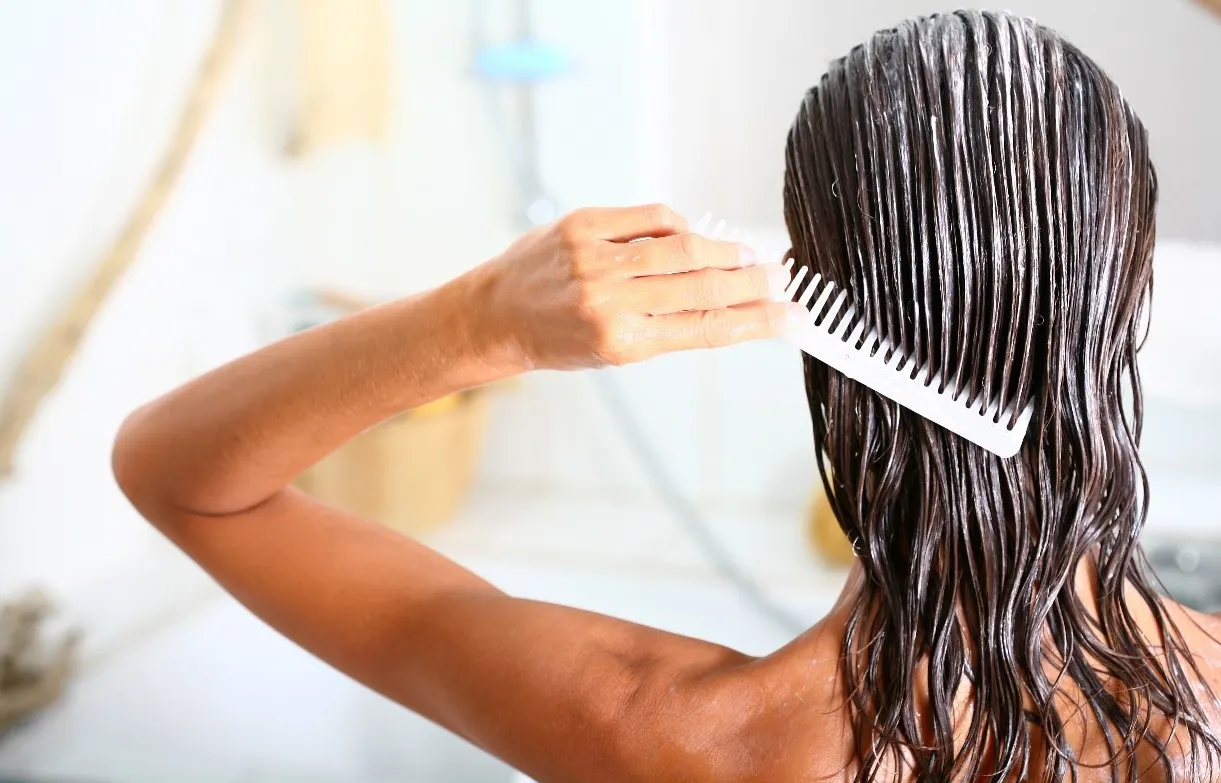Can We Use Hair Conditioners in Dandruff?
The use of shampoo and conditioner is recommended by all hair experts for clean hair, there is no debate about that. Even hair bloggers who have tried to go without any product for a month will attest to this. Shampoo is used to clean away the sweat, dirt, hair product or even dead-skin cells from your hair and scalp. Conditioners are used to soften your hair strands and make them easy to manage. They contain fatty alcohols and oils that help trap moisture within your hair. Some are made with proteins to help with split ends, and some contain thickening compounds that add size. Most have a creamy texture which allows for easy application on your hair.

When it comes to dandruff, we often mistake it for a dry scalp and think that we need to apply oils and conditioners to our head. But dandruff is not caused by the drying out of your scalp, it’s actually because of excessive oil.
What is dandruff?
Dandruff is caused by a fungus that feeds on the excess oil found on your scalp. Sometimes it can occur on other parts of your body as well, like the face and back. Your scalp is covered in sebaceous gland that can increase oil or sebum production due to various reasons like stress, hormonal fluctuations, and even poor hair care. The fungus breaks down this oil and your body reacts in the form of itching and flaking. One thing to note is that only half the people in the world react to this by-product.
We know that conditioners contain some form of oil and act as lubricating agents for your hair. We also know that dandruff is caused by a build-up of oil on your scalp. So, if you add conditioner to your dandruff ridden scalp, how does it all play out?
Conditioner and dandruff
With anything related to your hair and scalp, different situations require different approaches. It’s the same with a conditioner. There are some situations where a conditioner is good for your dandruff, and some situations where it can make your dandruff worse.
If your hair is dry and frizzy, that is often due to scalp oil getting trapped and the normal flow to the tips of your hair becoming blocked. This creates a heat trap in your hair, which allows sweat and dirt to mix with the oil. The dandruff causing fungus grows exponentially and leads to a breakout. You’ll notice this scenario when you have dry hair but an extremely oil scalp.
So, if you employ hair conditioners in this situation, it can open your hair strands and allow the scalp oil to flow freely down to the tips of your hair. This restarts the natural ecosystem of your hair and scalp, bringing it back to normal conditions.
On the other hand, conditioner dandruff is also possible on your scalp. Because your scalp is already oily, the conditioner oils can end up becoming a cause of dandruff. You’ll notice that conditioners have a slightly greasy texture. If conditioners are used too often or in large quantities, your scalp oil has nowhere to go. It again gets trapped on your scalp and leads to an increase in conditioner dandruff. This will be evident in the greasy look of your hair.
Should you use conditioners?
It all depends on your hair type. They exist because they have a role to play in the health of your hair. Dry, colour-treated, or heat-treated hair tend to be brittle and dull. Sometimes this can even dry out your scalp and increase oil production, which is not something you want. Use of conditioners can help in stopping these problems from becoming much worse. But it is best to avoid if you already have oily hair.
Here are some hair care tips to keep in mind when using conditioners:
- After shampooing your hair, apply a small quantity of conditioner onto your hair. Use your fingers or a comb to spread it throughout the hair. Leave it in for a few minutes and then wash your hair thoroughly.
- Leave-in conditioners don’t need to be rinsed out and act as a protectant against the external elements. You apply them in small doses occasionally.
- You also have 2 in 1 shampoo and conditioners that combine the cleaning effects of a dandruff shampoo with the moisturising properties of a conditioner. These are perfect if you’re rushed for time. Try the Head and Shoulders 2 in 1 Smooth and Silky that revitalises you and leaves your hair dandruff free.
- Avoid applying conditioner to your scalp, as most conditioners are not manufactured for your scalp. Some can increase scalp oil and lead to conditioner dandruff.
- There are also anti-dandruff conditioners consist of Argan oil and Aloe Vera, which soothes your itchy scalp and is a great answer on how to get rid of dandruff.
- Always do a patch test to see that you do not react to the conditioners.
- You should thoroughly rinse out any conditioner from your hair, unless it’s a leave-in. This can trap oils and cause an increase in dandruff, making you wonder – is conditioner good for dandruff.
- Keep the conditioner away from your face as it might cause acne. This is a rare occurrence and the connection is not proven, but you should always be aware of this potential problem.
While we might have understood whether conditioner causes dandruff, many people prefer to use natural products on their hair. Essential oils like Argan oil and natural oils like Coconut oil, are used extensively to moisturise your hair.
You can also use Aloe Vera on your hair and scalp as it moisturises your hair, removes oil build-up, and calms down any inflammation. So, you have natural and manufactured options available for your hair problems. All you need to do is find whatever works for you and say goodbye to your dandruff.



